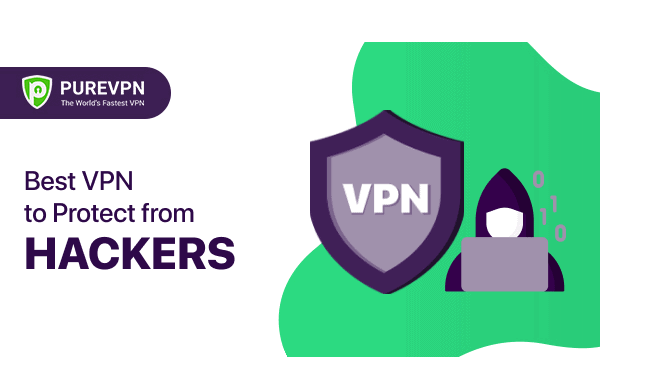VPNs can help you with many things, from hiding your browsing history and getting better deals to streaming geo-blocked content and bypassing ISP throttling. However, does it protect you against hackers as well? The short answer: yes!
A VPN will keep you safe from hackers, but it isn’t enough alone. You’ll have to use them in conjunction with other tools and follow smart browsing practices if you want to steer clear of most, if not all, cyber-attacks. Confused? Read on as we explain:

Does a VPN Protect You From Hackers?
While VPNs provide a certain degree of protection, it’s important to realize that they’re not a one-stop security solution. To give you a better idea, let’s take a look at what a VPN can and can’t do in terms of keeping you safe:
What a VPN Can Do
Stop MITM Attacks
A man-in-the-middle attack (MITM) occurs when a hacker sits between you and whatever you’re doing online. There are many different types of MITM attacks out there, and one of the most common is Wi-Fi eavesdropping.
That usually involves using packet sniffers to intercept your traffic and steal personal data such as credit card numbers while using an unsecured public Wi-F hotspot. (That unsecured hotspot is the MITM.) However, home networks are also vulnerable.
Most wireless networks use WPA2, but it can easily be cracked due to a security flaw. The newer WPA3 isn’t without its issues either. The good news is that you can stay protected using a VPN – all your data is encrypted, which prevents hackers from monitoring it!
Prevent DDoS Attacks
A distributed-denial-of-service (DDoS) attack seeks to overwhelm your network with unwanted traffic from multiple sources, usually numbering in the hundreds or thousands. The idea is simple: to overwhelm your system so thoroughly as to force you offline for an extended period of time.
These days, almost anybody can run a DDoS attack. In fact, they sell for as little as $10 per hour on the dark web! Crazy, right? This is where a VPN comes into play. For a DDoS attack to be successful, the hacker launching it needs your IP address. They won’t be able to find and target your network without it.
Since a VPN masks your IP address, they can help you prevent DDoS attacks. Some providers like PureVPN even offer anti-DDoS VPN servers that are capable of withstanding large-scale DDoS attacks.

What a VPN Can’t Do
Avoid Phishing Attacks
The best a VPN can do is block connections to shady or malicious websites using a blocklist (kind of like a firewall). However, it can’t do anything to stop the bad guys from targeting you with phishing via social networks, emails, etc.
Why? Because that line of defense hits you via direct communication, which a VPN still lets you access. But you’re the weakest link. If you let your guard down and click on a dangerous link that might end up getting through these networks, you’re susceptible to being a victim.
Remember, you may be protected from people breaking into your internet connection, but these communications aren’t impacting your internet connection. They’d get to you regardless of where you’re connected on the ‘net.
According to estimates, around 1.5 million phishing websites are created every month – it’s likely that most of them won’t be identified by the VPN’s blocklist. Plus, as explained above, if you download a malicious attachment or reply to a phishing email, a VPN won’t be able to keep you safe.
Thwart Malware Attacks
Though some cyber-attacks involve a hacker launching DDoS attacks or eavesdropping on traffic over public and home Wi-Fi, many others include malware — i.e. malicious software or file(s) — that infect your device. Malware can allow cybercriminals to do many things, including, but not limited to:
- Logging your keystrokes
- Recording your screen
- Stealing and deleting important files
- Infecting your entire network and every device that connects to it
Unfortunately, a VPN can’t protect you from any of that. If your device gets infected with malware, only using antivirus can help.
How Does a VPN Protect You From Hackers?
Here’s how a VPN keeps you protected against hackers:
Encrypts your data
A VPN is used to create a secure connection between your device (mobile phone, laptop, etc) and the internet. This is made possible by encrypting your data. All information is encrypted on your device and transmitted to a VPN server where it’s decrypted and forwarded to the intended destination.
Most leading VPNs like PureVPN use AES 256-bit encryption, which is the industry-standard and makes your data impossible to crack. It would take billions of years even with a supercomputer! The bottom line: when a hacker intercepts your data, they won’t be able to make sense of it.
Hides your IP address
Every device connected to the internet is given an IP address. It acts as your digital home address, but can also be used to track your approximate location. However, when you use a VPN, you connect to a remote server before going on the internet.
As a result, all your online activities (the files you download, the emails you send, etc.) are associated with the server’s IP address rather than your own. Your true IP address is hidden, meaning hackers can’t figure out where you are or break into your device.

PureVPN – The Best VPN to Stay Safe from Hackers
Need a reliable VPN to stay safe from hackers? Look no further than PureVPN. Here’s what makes us the best choice:
Kill Switch
With this feature enabled, you’re automatically disconnected from the internet if the VPN connection drops. That prevents your data from accidentally leaking online.
DDoS Protection (Paid Add-On)
PureVPN hides your real IP address and filters incoming traffic via anti-DDoS VPN servers capable of combating the most serious DDoS attacks.
Secure VPN Protocols
The VPN protocol you choose has an impact on your security and speed. Choose IKEv2 or OpenVPN for the best possible security without sacrificing on speed.
IP Leak Protection
Keep your true IP address from leaking and exposing your identity and location. Activate our DNS and IPv6 leak protection.
Other Ways to Protect Yourself from Hackers
Using a VPN adds a robust layer of defense, but you need to do more to improve your security. Here are some tips to keep in mind:
- Update all software (operating system, web browser, etc) on a timely basis to patch serious security issues.
- Enable your firewall (whether it’s software or hardware) to secure your network from malicious traffic.
- Install antivirus software on your device to sniff out and get rid of malware like viruses and worms.
- Use two-factor or multi-factor authentication where available to make it difficult for hackers to access your accounts.
- Add an anti-phishing extension to your browser like MetaCert and stay up to date about phishing techniques.
- Change your router’s default username and password and disable features like Remote Access, WPS, and UPnP.
- Be vigilant! Humans are often the weakest link and our mindless clicking could result in a digital catastrophe.
Wrapping Things Up
To sum it up, a VPN does offer some protection against hackers, but you’ll have to take additional steps to stay safe against all kinds of cyber-attacks.
Got any questions? Feel free to use the comments section below, and we’ll get back to you as soon as we can!



